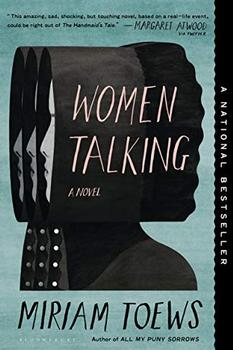Summary | Excerpt | Reading Guide | Reviews | Beyond the Book | Readalikes | Genres & Themes | Author Bio

My name is August Epp—irrelevant for all purposes, other than that I’ve been appointed the minute-taker for the women’s meetings because the women are illiterate and unable to do it themselves. And as these are the minutes, and I the minute-taker (and as I am a schoolteacher and daily instruct my students to do the same), I feel my name should be included at the top of the page together with the date. Ona Friesen, also of the Molotschna Colony, is the woman who asked me if I’d take the minutes—although she didn’t use the word “minutes” but rather asked if I would record the meetings and create a document pertaining to them.
We had this conversation last evening, standing on the dirt path between her house and the shed where I’ve been lodged since returning to the colony seven months ago. (A temporary arrangement, according to Peters, the bishop of Molotschna. “Temporary” could mean any length of time because Peters isn’t committed to a conventional understanding of hours and days. We’re here, or in heaven, for an eternity, and that’s all we need to know. The main houses in the colony are for families, and I’m alone, so it is possible I may always, forever, live in the shed, which doesn’t really bother me. It’s bigger than a jail cell and large enough for me and a horse.)
Ona and I avoided the shadows as we spoke. Once, in mid-sentence, the wind caught her skirt and I felt its hem graze my leg. We side-stepped into the sun, again and then again, as the shadows lengthened, until the sunlight had disappeared and Ona laughed and waved her fist at the setting sun, calling it a traitor, a coward. I grappled with the idea of explaining hemispheres to her, how we are required to share the sun with other parts of the world, that if one were to observe the earth from outer space one could see as many as fifteen sunsets and sunrises in a day—and that perhaps by sharing the sun the world could learn to share everything, learn that everything belonged to everyone! But instead I nodded. Yes, the sun is a coward. Like myself. (I kept silent, too, because it was this tendency of mine to believe, with such exuberance, that we could all share everything that landed me in prison not long ago.) The truth is, I don’t have a catchy method of conversing and yet, unfortunately, suffer on a minute-to-minute basis the agony of the unexpressed thought.
Ona laughed again, and her laughter gave me courage, and I wanted to ask if I was a physical reminder of evil to her, and if that was what the colony considered me to be, evil, not because I had been in prison but because of what had happened long ago, before I became incarcerated. Instead, I simply agreed to take the minutes, of course—I have no choice other than to agree because I would do anything for Ona Friesen.
Excerpted from Women Talking by Miriam Toews. Copyright © 2019 by Miriam Toews. Excerpted by permission of Bloomsbury USA. All rights reserved. No part of this excerpt may be reproduced or reprinted without permission in writing from the publisher.
I find that a great part of the information I have was acquired by looking something up and finding something else ...
Click Here to find out who said this, as well as discovering other famous literary quotes!
Your guide toexceptional books
BookBrowse seeks out and recommends the best in contemporary fiction and nonfiction—books that not only engage and entertain but also deepen our understanding of ourselves and the world around us.